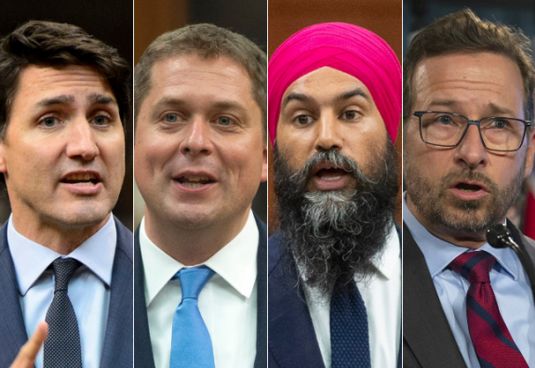MONTREAL, Que. — As it does in so many ways in the federation, Quebec stands alone among all provinces for the dynamism of its federal politics.

It can fall madly and completely in love with a politician and a party, as it did in 2011 with ‘Le Bon Jack’ and the NDP, and just as quickly lose interest as it casts about for a new focus of its political affections.
And so it is now with the NDP in this province. In 2011, Jack Layton won 59 of the province’s 75 seats. Thomas Mulcair could hold only 16 in 2015 and now, four years later, Jagmeet Singh faces the prospect of a complete NDP shutout.
Meanwhile, the Liberals under Michael Ignatieff in 2011 got the coldest of shoulders from Quebecers, winning just 7 seats in this province that year. During that 2011 campaign, the late Jean Lapierre, former Liberal MP but then a media pundit, cracked that the only red signs that could be found in Quebec were stop signs.
But a new leader — Justin Trudeau — brought new affection for the Liberals in 2015 and Quebecers came back to the Liberal brand in droves, giving that party 40 of 78 seats. And all the current polls indicate that the Liberals are almost certain to win more seats here and all at the expense of the NDP.
- Alberta budget 2026 comes with spending hikes but $9.4B deficit
- Poilievre calls Trump’s Canada attacks ‘wrong,’ urges U.S. trade stability
- Liberals survive confidence vote as House passes budget implementation bill
- Liberal, Bloc Québécois rematch in Terrebonne riding after Supreme Court nixes result
That makes the race here — and Wednesday’s French-language television debate — all the more important for the Liberals. Trudeau’s team can be expected to lose seats elsewhere in the country. Liberals are unlikely to sweep Atlantic Canada as it did in 2015; some of the 80 seats the Liberals won in Ontario are likely to fall; and in the four Western provinces, rare wins in otherwise conservative-minded ridings in Calgary or in Kelowna, B.C. are unlikely to be repeated.

Get breaking National news
So for the Liberals to continue to govern, a stronger-than-2015 performance in Quebec is crucial. And it seems, at this point, Liberals may get that strong performance.
In an online survey conducted exclusively for Global News between Sept. 27-30, Ipsos found that 35 per cent of decided and leaning voters in Quebec would cast a ballot for the Liberals; 24 per cent would cast a ballot for Andrew Scheer’s Conservatives; 22 per cent would be for Yves-Francois Blanchet’s Bloc Quebecois; 11 per cent would pick Singh’s NDP and 7 per cent would be ready to endorse a candidate from Elizabeth May’s Green Party.
The debate Wednesday, hosted by Quebec private sector broadcaster TVA, will feature four of those five leaders. TVA did not invite the Green’s May, much to her displeasure and, perhaps, much to the displeasure of the 300,000 or more Quebecers who participated in the climate action strike marches in Montreal last Friday.
WATCH BELOW: Students highlight huge day of protests during global climate strike

That presents an opening for Singh to sell his plan as greener than the Greens.
And in a province where, according to internal polls obtained by Global News prepared for the Privy Council Office, environment and climate change are much higher priorities than any other province, having strong green bona fides is crucial.
For that reason, expect all parties to gang up on Trudeau. Trudeau will be forced to defend the decision to spend billions in federal funds to buy the TransMountain pipeline even as Quebecers want the the federal government to do more to help expand the production of clean hydroelectric power in Quebec.
Blanchet, in his first campaign as BQ leader, is leading a reinvigorated party and can be expected to use a piece of provincial legislation — Bill 21 —as a sharp wedge to drive down Liberal support. Bill 21 prohibits public sector employees — teachers, judges, police officers and so on — from wearing religious symbols such as hijabs, yarmulkes and, yes, turbans on the job. Bill 21 has been widely denounced in English Canada — indeed, Calgary city council just passed a resolution to that effect — but here in Quebec it is very popular.
Trudeau has said he opposes Bill 21 and if those in Quebec that are fighting the law in the courts lose, he said he would be prepared to direct federal government lawyers to go to court to strike down the law.
Scheer, the Conservative party leader, has been more muted in his criticisms of Bill 21, saying only that no Conservative government would ever enact such a prohibition.
And so, the most interesting moment of Wednesdays debate may well be when Blanchet confronts Singh about Bill 21. Because Singh, a devout Sikh, wears a turban, Blanchet will have to explain to Singh directly why his turban represents a threat to Quebec society that justifies the prohibitions of Bill 21. Conversely, Singh’s prosecution of Bill 21 in this debate may win him little support among Quebec voters but it could win him more support in English Canada.
David Akin is the Chief Political Correspondent for Global News.








Comments
Want to discuss? Please read our Commenting Policy first.